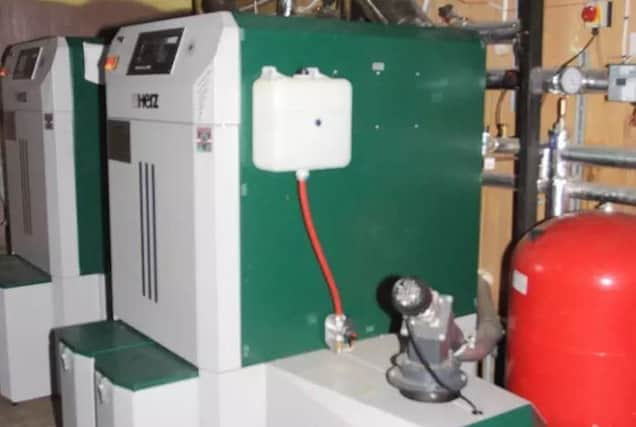Farmer who got £660k for 13 RHI boilers says only £80k was profit


Paul Hobson, a Dungannon poultry farmer who supplies Moy Park, installed his first biomass boiler just eight months after the scheme was launched in late 2012 and went on to put in a further of the 12 wood pellet heating systems.
The scale of Mr Hobson’s income from the scheme shows how eye-wateringly lucrative the payments are, even for those who like him are using it for an entirely legitimate purpose such as raising poultry, which requires considerable heat.
Advertisement
Hide AdAdvertisement
Hide AdIn an interview with the News Letter last night, Mr Hobson spoke candidly about his claims. He said that his site had been one of the few audited by Ofgem (in November 2015) and given a clean bill of health.
And he gave the News Letter the exact figures for what the boilers have cost him since installation.
Details of his claim emerged yesterday after Stormont’s Department for the Economy finally released the first list of non-domestic RHI claimants more than three months after the December 6 BBC Spotlight investigation into the mismanagement of the scheme provoked public outrage.
The list – which is published in full across six pages of the News Letter today – contains details of farmers, churches, golf clubs, Sainsbury’s supermarkets and numerous other businesses who have been claiming.
Advertisement
Hide AdAdvertisement
Hide AdThe list is the first tranche of company names released by the department and there is no suggestion whatsoever that those on the list are engaged in improper activity.
Mr Hobson, whose farm is at Mullybrannon Road in Dungannon, is the highest claimant on the list released yesterday.
The farm has claimed for a total of 13 boilers, eight of which were installed within about 13 months of the scheme being opened. However, Mr Hobson told the News Letter that he only had a maximum of 10 at any one point as several of the initial boilers were not performing satisfactorily and had been replaced.
There is no suggestion that Mr Hobson – who is one of Moy Park’s biggest suppliers, with 130,000 chickens – has been in any way abusing the scheme, something borne out by the fact that just two of the farm’s boilers are the most lucrative 99kwth version, with all the other installations being of a smaller capacity.
Advertisement
Hide AdAdvertisement
Hide AdDespite the high payments – which are partially as a result of him being one of the first to enter the scheme – the type of the boilers points to a genuine matching of each boiler to what was required rather than an attempt to milk the system.
When contacted by the News Letter last night, he readily answered all of our questions and said he was keen to stress several factors which would not otherwise be apparent to members of the public reading about his total claims.
He explained that the total installation cost had been £380,000.
And, over the period covered by the figures Mr Hobson said that he had spent £426,000 on wood pellets, £75,000 on electricity to run the system, £12,000 on boiler servicing, £10,000 on parts and £57,000 on interest payments for the loans which financed the investment.
Advertisement
Hide AdAdvertisement
Hide AdThat means that in less than four years Mr Hobson has made about £80,000 in profit.
“I was one of the first into the scheme,” he said, explaining that he had read about the English scheme on the internet even before Stormont launched its version.
“When I started it wasn’t as lucrative as it is now. The pellet price was £185 per ton; now it’s dropped significantly – it did drop to £145 a ton but it’s back up to £155 and is on an upward trend now as the Euro gets stronger because pellets are mostly imported from Europe. Yes, while pellets were at £145 it was good because the [tariff] was working out at more than the pellet cost.”
He added: “I was replacing gas heating with biomass; I’d heard it was a good scheme and thought it was going to be economically viable to convert.”
Advertisement
Hide AdAdvertisement
Hide AdMr Hobson said that when he installed the first two boilers “I didn’t really understand the system...I had to learn the hard way” and that salesmen had told him they were “the best thing on earth but they were rubbish; I lost money there”.
Mr Hobson said that some of those coming after him when the boiler market was more competitive would be in a more lucrative position.
He said that since he installed the system there had been “quite an upturn in the return from my chickens” due to the improved conditions in his poultry sheds, something which will be reversed due to Stormont slashing rates.
Mr Hobson said he did not mind his name being made public but that he wanted the public to understand the full story. He added: “I do realise it was open to abuse in this country because of the way it was set up – it should have been tiered, the way it is in England. I would have had no problem with that.”
Advertisement
Hide AdAdvertisement
Hide Ad• If you have information about the RHI scheme, contact Sam McBride on 0289089 7722 or email [email protected]
SEE PAGES 14 TO 19 of TODAY’s NEWS LETTER FOR THE FULL LIST